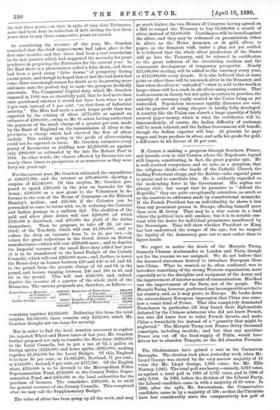In considering the revenue of the year, Mr. Goschen remarked
that the chief improvement had taken place in the first nine months, and that there had been a real retardation in the last quarter, which had suggested the necessity for great prudence in preparing the Estimates for the current year. In the East there is a phenomenon called a false dawn, and there had been a good many "false dawns" of prosperity during recent years; and though he hoped that at last the real dawn had
come, there was enough reason for doubt as to its growing more and more unto the perfect day, to make the prospect decidedly uncertain. The Companies' Capital duty, which Mr. Goschen imposed in 1888, was so cheerfully paid, that he had more than once questioned whether it would not have been wiser to put 2 per cent. instead of 1 per cent. "on that form of industrial activity." The Mint had made a much larger profit than was expected by the coining of silver (£774,000, as against an estimate of £200,000), owing to Mr. Goschen having authorised the payment of the small charge of a quarter per cent. made by the Bank of England on the transmission of silver to the provinces, a charge which had checked the flow of silver unduly. This sudden spring in the profit of -silver-coining could not be expected to recur. Mr. Goschen estimates every penny of Income-tax as yielding now £2,200,000, as against only £800,000 as estimated by the late Sir Robert Peel in 1844. In other words, the classes affected by Income-tax are nearly three times as prosperous or as numerous as they were
forty-six years ago.


















































 Previous page
Previous page